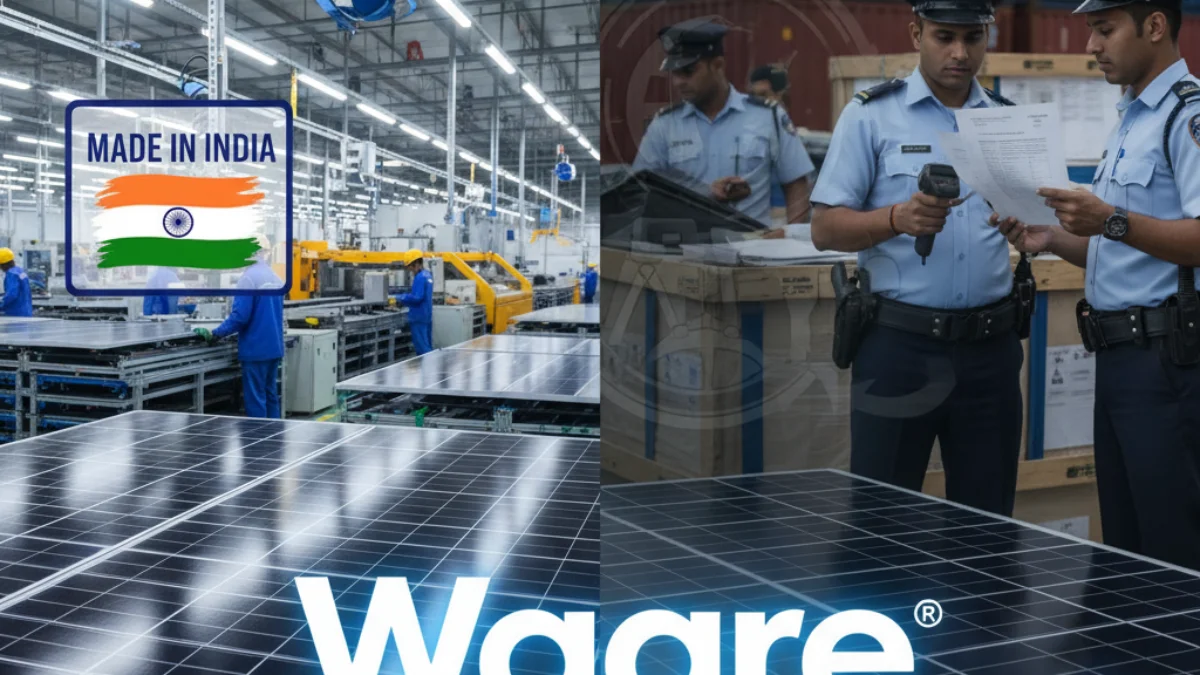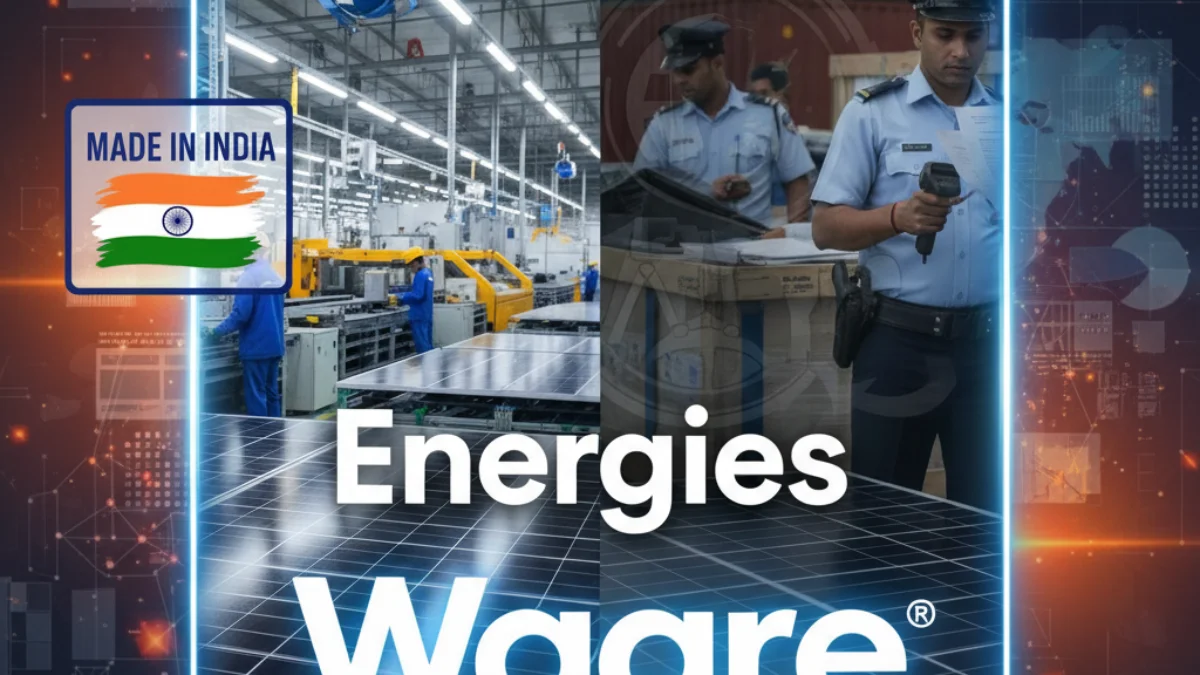In late September 2025, Waaree Energies - India’s prominent solar module manufacturer - found itself under deep scrutiny from U.S. Customs and Border Protection. The agency has launched a formal probe into whether Waaree mislabelled Chinese-made solar cells and panels as Indian-made, allegedly evading decades-long antidumping and countervailing duties.
The news triggered a sharp reaction: Waaree’s shares plunged 4-6 percent intraday. The broader question now: How will the probe reshape Waaree’s trajectory - especially as it simultaneously invests heavily in battery cell manufacturing, smart meters, and international supply contracts?
This article unpacks the competing threads: the import-duty allegations, Waaree’s strategic diversification, and what this means for the Indian solar industry and global trade enforcement.
The Allegations: U.S. Tariff Evasion Under the Lens
The heart of the inquiry lies in trade classification and origin labeling. U.S. officials suspect that Waaree imported Chinese-origin solar components (cells or modules), but declared them as manufactured in India. Because solar imports from China and neighboring countries are subject to antidumping and countervailing duties, mislabeling would circumvent enforcement.
To protect U.S. revenue while the probe proceeds, the agency is demanding cash deposits from Waaree as provisional measures. The probe was triggered in part by a petition from the American Alliance for Solar Manufacturing (AASM), a consortium of U.S. solar firms.
Waaree has not yet issued a detailed public rebuttal. The case may hinge on tracing origin rules, import records, and the degree of "value addition" claimed in India.
Strategic Moves: Battery Cells, Metering, and Module Orders
The timing of the probe comes as Waaree accelerates its footprint beyond modules.
- Battery cell plant: The company announced a ₹300 crore investment into its energy storage subsidiary to build a lithium-ion cell manufacturing facility.
- Smart meters expansion: Waaree will acquire 76% in Racemosa Energy India for ₹53 crore - a push into grid technology.
- Global module contracts: Earlier this year, Waaree secured a 586 MW supply deal with Pine Gate Renewables in the U.S., manufacturing via its Texas unit.
- Manufacturing relocation: It has shifted its planned 6 GW vertically integrated facility from Odisha to multiple states including Gujarat and Maharashtra.
These moves suggest Waaree is hedging its risk by embedding deeper into the full solar-to-storage value chain. If the U.S. case narrows module revenues, battery and grid segments could cushion the blow.

Market Reaction and Investor Sentiment
For its listing in October 2024, Waaree's stocks had already seen a surge of ~37%. But fresh worries caused by the probe triggered a sharp drop of 4-6%.
Still, the underlying business had shown strength earlier in 2025. In Q1 FY26, Waaree’s net profit jumped 89% year-on-year to ₹745 crore, spurring a 4% stock rally. In a bullish sign, Nomura recently initiated coverage on Waaree with a target upside of 16%.
Market watchers point to this juxtaposition: strong fundamentals meeting elevated regulatory risk.
Risks, Outcomes, and Industry Ripple Effects
The probe poses serious challenges, but several paths may unfold:
- Penalties and back duties: If found culpable, Waaree could face a large duty claim plus interest.
- Trade restrictions: Future Indian module exports might draw extra scrutiny or face provisional tariffs.
- Reputational damage: Client confidence could erode in both domestic and international markets.
- Diversification payoff: Successful entry into cells, storage, or metering might reduce reliance on module margins.
Beyond Waaree, the case sends a message across the Indian solar manufacturing base: origin certificates, traceability, and documentation will become battlegrounds in export markets. For deeper insight into how tech firms guard proprietary supply chains, readers can explore Nuvexic’s approach to compliance and traceability in complex supply webs.
Conclusion
The Waaree Energies probe is more than a legal flashpoint - it’s a stress test for Indian solar’s export model. The company now straddles two worlds: one litigated by U.S. trade law and another shaped by global clean-energy ambitions.
In navigating the fallout, how Waaree handles audits, defends origin claims, and delivers on its battery and metering bets will define whether this becomes a crippling scandal or a strategic pivot. The larger industry will watch closely: a strong defense might deter aggressive investigations, while a misstep could reshape export norms overnight.
Stay alert as this story evolves - subscribe for updates and expert breakdowns.
Frequently Asked Questions
Q: What triggered the U.S. probe into Waaree Energies?
The probe originated after the American Alliance for Solar Manufacturing petitioned U.S. Customs, alleging Waaree mislabeled Chinese-origin solar cells and panels to avoid anti-dumping and countervailing duties.
Q: How serious are the financial risks for Waaree?
If violations are confirmed, the company could be liable for back duties, penalties, and interest. Restrictions on exports may also dent revenue prospects in key markets.
Q: Can Waaree's investment in batteries and smart meters offset the probe’s impact?
Potentially. Diversification into energy storage and grid tech offers alternative revenue streams less exposed to module trade scrutiny.
Q: What is Indian solar sector’s broader risk from this case?
The case raises the bar for compliance across the industry - exporters will face stricter demands for origin documentation, traceability, and audit readiness.
Q: When might the U.S. case reach resolution?
Such investigations often stretch months to years, depending on complexity. Waaree may face audit rounds, hearings, and appeal windows before final determinations.

